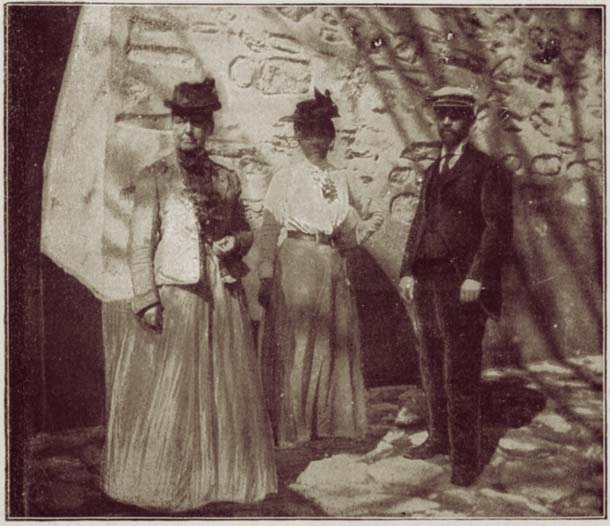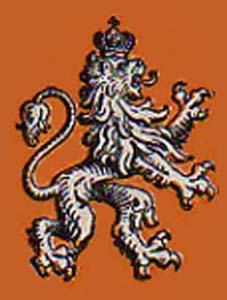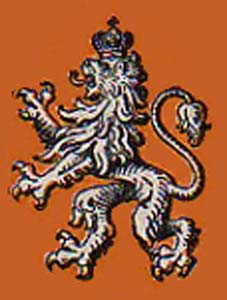|
|
Liberation, and
Flight
With the ransom
paid and the time and place of release negotiated, the ordeal was nearing
an end. As dawn broke after a final hard
night march through the wilderness on the morning of February 23, 1902,
Miss Stone and Katerina Tsilka found
themselves on the outskirts of a village not far from the town of Strumitsa. After attending to baby Elencha, the two women gloried in
a long bath, and began the process of recuperating their strength and
well-being.
Both women were
subjected to close questioning and interrogation, but as Turkish subjects,
the Tsilkas were naturally under greater threat of reprisal by Ottoman
authorities. Both Tsilkas prepared depositions with their
recollection of events, and Katerina's transmittal of a copy for the
American embassy revealed some of her frustration:
Salonique, Turkey, March 29, 1902
Dear Sir,
Your letter of
March 21st, is at hand. In the enclosed statement I have tried to
write all I can remember of our captivity which may assist in the
discovery of the villains, but in case I have failed to answer points you
may desire, I shall be glad to answer any questions you may choose to ask
me.
Mr. Leishman,
excuse, if I ask you a personal favor. Is there any possibility in
shortening our case with the government here? They keep us here
apparently without doing anything. Both my husband and myself have
been thoroughly examined, and now I do not see what they are waiting for.
My husband has been without work for the last seven months, and now we are
spending all the means we have. It is very hard on us.
Respectfully
yours,
Katerina Tsilka

The Tsilkas and Miss Stone, 1902,
after the Ordeal
The following
month, James H. Ross, writing in Leslie's Weekly, of April 10, 1902, p.
348, summarized some of the difficulties the Tsilkas faced with the
Turkish authorities:
Strange Sequel of the Capture of Miss Stone
By James H. Ross
Immmediately preceding the release of Miss Stone by the Bulgarian
brigands who captured her, a cablegram announced that the husband of Mme.
Tsilka had been arrested charged with being a conspirator who had aided in
selling his wife into captivity. Since then, the public has heard but
little as to the sequel. The case is not ended. Neither is it settled.
Turkey never hurries. Neither Mr. Tsilka nor the friends of Miss Stone
know what Turkey will do. Technically Mr. Tsilka was not arrested, but was
detained and is under surveillance. When, on February 23d he knew by
telegraphic message from Serres to Salonica that the captives were
released, he planned to leave at once, to meet his wife. But the police
would not allow him to go. The Turks seemed to be very suspicious of him.
Such restraint as there was on their part was due to the fear that foreign
correspondents of the European and American press would make it hot for
them.
Mr. Tsilka. on February 25th, was finally allowed to leave Salonica.
Consular Agent Lazzaro conferred with the missionaries and with Vali Pasha
concerning his case. On Friday, February 27th, he boarded the train in
Salonica for Sofia and was called out before the train started and
detained. The police mudir said that he might go anywhere he pleased in
the Vilayet, but not out of the country. February 24th he was permitted to
leave Salonica by rail, to meet his wife and return with her. The Vali
showed Mr. Lazzaro an order from the Minister of the Interior telling him
not to let Mr. Tsilka go out of sight, and adding: "I think this is its
accordance with the wishes of the American legation." But he may have
misinterpreted the wishes of the legation. Mr. Tsilka repeatedly said:
"All I want is a fair trial without torture. If they can prove anything
against me, I am ready to suffer." It was possible that letters had been
forwarded to him from America, excoriating the Turks, and that they had
been intercepted. But he said, with truth, that he should not he held for
what another had written who was not under his control.
Assuming that he had been deceptive while living in Salonica with the
missionaries for six weeks they would have condemned him in severest
terms. Such baseness as was charged against him. viz.: Selling his wife
and causing so much anguish to so many hearts, in many lands for six
months, would have deserved heavy judgment in speech and judicial
punishment. But if he has been an innocent sufferer, like the missionaries
themselves and the kindred and friends of Miss Stone, any addition to his
sufferings by false charges and imprisonment is intolerable. If charges
against him are pressed, the civilized world will wait with wonder for the proofs.
If sound proofs are not forthcoming, his arrest will be regarded its an
act of cruelty, and Turkey will lose that much in the world's estimation.
Moreover, Miss Stone wields the pen of a ready writer, and if she is
convinced of his innocence, she will he unsparing in her denunciations
through the press. Her character and courage are well known.
As Mr. Tsilka himself has no objections to testifying, no one else will
object to his being examined by the authorities. For that purpose arrest
and imprisonment are not necessary. American influence can he exerted to
aid in securing him judicial and fair treatment. The commander in Serres
has persistently hindered the work of liberation and broken his promises
not to chase the band who held the captives, thereby imperiling their
lives. He is known to be hostile to Mr. Tsilka. The American principle is
to believe a man innocent until proven guilty. If innocent, Mr. Tsilka is
suffering for being associated with an American citizen. The Americans in
Salonica will turn every stone to help him, until he is proved guilty.
Nothing yet heard would be regarded by a grand jury in this country as
warranting an indictment. What Turkey will continue to do, time alone can
tell. It may do nothing more: it might do much more. For ways that are
dark and tricks that are vain, Turkey is peculiar.
LESLIE'S WEEKLY has special facilities for keeping its readers informed
of the political agitation through which Bulgaria and Macedonia are now
passing, and of the quality of the leaders who are the agitators, and
there are reasons for believing that the ransom of Miss Stone, the
captured missionary, may only lead to new and more serious troubles. The
Bulgarians, among themselves, before they obtained their freedom from
Turkey, in 1878, were a comparatively pure people. Now licentiousness is
bold and often brings no disgrace. The use of intoxicating liquors, aside
front the twines of the country, is probably tenfold what it was in 1860,
and the use of wine has greatly increased. Infidelity, bold and
aggressive, was scarcely known in 1860. Now many teachers, probably the
larger part of the influential men and a very large proportion of the
students, are said to be boldly godless. During the past ten years,
students have been expelled from the missionary schools for unmentionable
vices. Infidelity, rank socialism, and all forms of godlessness have
greatly increased. It seems probable that some of the ransom money paid
for the release of Miss Stone and Mrs. Tsilka has been supplied to be
used in preparation for incursions from Samokov into Macedonia.
Macedonia ought to be free. The only doubt is whether the resort, to
arms should be made. But the leaders of the Macedonian committee are men
of no principle and their followers become like them. Plans for various
inroads into Macedonia are being made. An American resident in Samokov
writes as follows:
When Servia fell upon Bulgaria, I went to see five student volunteers
take their summer night departure about 11 p. m. I respected them and my
heart was with them. As yet I have seen no one engaged to this Macedonian
movement whom I have respected, and whatever shall he done it will be done
chiefly under the guidance of those who hate God, at least so far as those
in Bulgaria are in this movement. All Macedonia wants freedom and will do
what will seem to lead to freedom, yet I fear that all the efforts will
result in much needless bloodshed, and I also fear that, in the end, no
real benefit will be gained.
There is apprehension among the American missionaries in Bulgaria lest
Miss Stone may not be the only captive by brigands. Fears are expressed
that other plotters may plan again to show that "little Bulgaria could
outwit great America and make her pay another ransom." One missionary has
been accustomed to travel alone on horseback, not infrequently from five
to twenty miles over old roads and mountain paths and often without any
path and through tangled bushes, striking for known landmarks miles away.
Twice, by anonymous letters, he has been threatened with death if he did
not pay money. He has disregarded the threats, and acted essentially as
though he had not received the letters. On the range of mountains among
which the Turkish troops chased the brigands who had Miss Stone, there is
scarcely any habitation. Hence the brigands are comparatively safe in such
a region with their captives. Some of the missionaries have notified their
associates and the official boards in this country, that if they are
captured they do not wish any ransom to be paid. They deem it wise that no
premium should he put on capturing missionaries.
On the 4th of March, thirty persons were brought to Monastir,
Macedonia, 100 miles northwest of Salonica, and put in prison. Their friends are not allowed
to see them. Arrests of suspected persons are made continually. The
prisons are full. The state of the country is very bad and there is great suffering, and many of the
sufferers are innocent. All the teachers at Racine, four hours' distant
from Monastir, have been brought to jail in Monastir. There is great need
that the European Powers should take up the matter of reforms in
Macedonia. An autonomy would solve many problems. Macedonia is honeycombed
with Bulgarian "committee" work. It was a political mistake to make
captives of Miss Stone and Mrs. Tsilka. Much sympathy for the Bulgarian
has been lost thereby. All Bulgarians do not approve of that step, however
much they may desire liberty in Macedonia.
Exchanges of
correspondence between Albania and the United States continued through
1902, and several letters found their way into print.
A letter from
Mrs. Tsilka, dated Kortcha, Albania, May 21, reports her again busily
engaged in her missionary work, which is in a prosperous condition.
The school at Korcha, which is in its boarding school department, had five
girls last year, now has eight. With abounding gratitude to God and
to the friends who have aided her rescue from the brigands, she and her
husband are devoting themselves with new energy to the work of
evangelizing their people. It may be also said of Miss Stone, that
though her labors are in another line, she is accomplishing much for
missions, for through her numerous addresses she is reaching a multitude
heretofore but partially, if at all, interested in missionary work, and it
is leading them to new conceptions of what this work is, and of the
character and abilities of those who are engaged in it.
[Missionary Herald, July 1902,
p. 272].
The following extracts
from a private letter from Mrs. Tsilka...give some details not mentioned
in the magazine articles: "Yes, we two women, Miss Stone and myself,
and the wee little woman who joined us later, went through fearful
suffering while in bondage. I have wondered at the capacity of the
human being for enduring misery...
"As for nursing, I lost
no chance, even among the brigands. The chief brigand fell one night
and injured his ankle, so that he had to be carried. When I offered
to give him all the help I could I never saw a brigand look so embarrassed
and remorseful as did he. While I was douching the sprained ankle
with hot and cold water, and especially when massageing it, he never
looked once at me. In a week, with this treatment, he was able to
walk a whole night with comfort. Though he never said 'thank you' to
me (for that is not a brigand's way), I knew he was grateful, for he saved
the life of my baby and me on more than one occasion...
Many of the brigands
brought to me their wounded and pus fingers to treat and cure. I am
sure that if they had been obliged to kill me they would have found it
very hard work to do so, for they 'had learned to love me,' as a young
fellow expressed himself. He was one for whom I treated four pus
fingers..."
[American Journal of Nursing, vol. 3, no. 3 (Dec 1902), p. 236-237]
Another Word from Mrs.
Tsilka
Mrs. Tsilka writes to
Miss Maxwell, from Kortcha:
"My adventures with the
brigands were so very dreadful -- very fearful; but, thank God! that is
all past, and to-day I am sitting down in a very bright cheerful room,
with my husband playing with Ellenchin, and I comfortably writing this.
You know. sometimes it seems so hard for anybody to live in this country
that many times we have been about ready to run to America. This
autumn some money was sent us from America to build a dormitory for the
girls. The necessary permit for the building was obtained.
Afterwards, when about half through, the government stopped us. All
the material was left exposed to the weather. It was done just to
give us trouble, for the government does not want improvements.
Besides that, the Greek Catholic Bishop persecuted us; they do not wish to
see Protestantism triumph. Besides these troubles, brigands are all
around us, and I can't help shiver at any gunshot in the night. If
we ever come to America, it won't be until next summer. I am afraid
to expose my darling any more dangers."
[American Journal of Nursing, vol. 3,
no. 5 (Feb 1903), p. 399
]
next section
|


